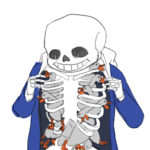pls unmute
What the fuck happened!?
That ground has terrible collision physics that’s what
Area Man Discovers New Dimension
Becomes Volume Man
Actually biologically there’s only two sexes, Capitalism and Banksy. It’s fucking science
spin the bottle except instead of kissing each other you fight
For anyone interested, consider the game Slap or Kiss. We played this game so many times senior year of college, I don’t know why our drunk selves were so obsessed with slapping and kissing each other. It’s exactly what it sounds like:
1. You spin the bottle. Whoever it lands on will either have to slap or kiss you.
2. You, the spinner, leave the room. Everyone else gets to vote on whether you will get slapped or kiss. Majority wins, the person who the bottle landed on doesn’t get a vote.
3. When it’s decided, you’re called back in for the surprise Slap or Kiss, and everyone watches with anticipation because they all know and you have no idea and i love it
Bonus: Combine it with Truth or Dare. If you don’t like the Truth or Dare you got, you can choose to do Slap or Kiss instead.
Why I stand with Planned Parenthood
Multiple gynos refused me an IUD because “oh, it hurts so much to put in when you’ve had kids! We don’t want to put you in pain!!”
I was at a 7-9 on the pain scale regularly for my periods, and the docs were determined to make me run the gauntlet.
“But what about the pill?”
“Symptom-swap.”
“Have you thought about depo?”
“Mood drop.”
“And the patch?”
“Family history of breaking out in rashes.”
“Well, what about the nuva ring?”
“How will that NOT give me the same symptom-swap issues?”
“…”
“Look, I’m in pain so bad I wake up in the middle of the night. I’m in pain so bad I didn’t know I had appendecitis. I need SOMETHING.”
“Have you tried an ibuprofen protocol?”
“YES.”
“There are yoga poses that help with cramping.”
“I can’t uncurl from the ball of pain I’m in. How the hell am I supposed to hold position?”
“Well, how much caffeine do you drink? That could be a factor.”
“I have three cups of coffee a day and drink lots of water.”
And so on.
Then, one day, I made an appointment and went to Planned Parenthood.
“Yeah. Hi. I have incredibly painful periods that are fucking crippling me, and I need an IUD.”
“Okay. Do you have a chart of your periods I can look at?”
“Yup.”
“Okay. Looks like you have regular, heavy periods where the pain is worsening. Is that right?”
“Yup. And the fatigue. And the mood swings. And all of it.”
“Fatigue and mood swings, too?”
“Yup.”
“…is there any history of endometriosis in your family?”
“Yup. I’ve never been diagnosed, though. They say it takes a biopsy.”
“The biopsy can confirm tissue, but if you don’t have excess tissue, it doesn’t really help. You can have endo without excess tissue.”
“Okay. So, what are my options?”
“I suggest Mirena. Paraguard can make period symptoms worse even though it’s got no hormones while Mirena has a low-dose hormone that should help with all your pain and other issues. Here’s all the info on both of them. Here are models of both of them. Why don’t you take everything with you, read through it, then call if you have any questions? We can go ahead and schedule for insertion before you leave, and you can just call and say which type you want after you’ve read up. Is that okay?”
“…Yeah. That’s. That’s fine.”
“Do you have any questions right now?”
“Um, I got told a bunch I shouldn’t get an IUD because the insertion will hurt too much because I haven’t had kids.”
“Looking at the pain you’re usually in, I think you can handle it. It will definitely hurt, but it should only last about twenty seconds.”
“Twenty seconds?”
“Yes.”
“I’ve been refused the best option for dealing with my symptoms because of TWENTY SECONDS?!”
“Sadly, we hear that a lot.”
Planned Parenthood treated me like a PERSON who was in pain, not a walking uterus bitching and moaning about womanly things. Planned Parenthood showed me respect and kindness and respected the knowledge I brought of my own medical history to the conversation. Planned Parenthood respected my autonomy where other doctors rarely had and paid attention when I explained why I felt the IUD was the best choice. Planned Parenthood showed me I mattered, and I want to show how much they matter to me.
^ the difference between a person’s symptoms being diminished versus believed.










